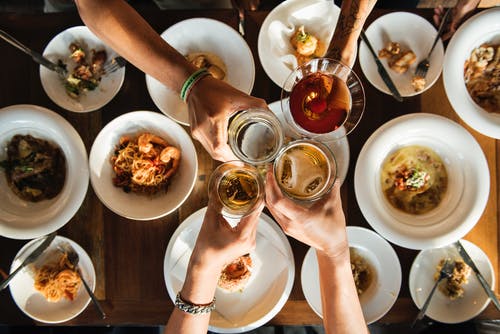
Posted: Jan 25, 2019

Americans aren't just setting the booze aside for Dry January. For the third year in a row, the country's total consumption of beer, wine, and spirits declined, but the well hasn't quite dried up when it comes to indulging in a tipple at work events.
Despite flagging interest in consumption, trends toward alcohol avoidance for health and wellness reasons, and concerns about its role in sexual harassment and injury claims, drinking remains a fixture of many work environments. That's according to a recent survey from Niznik Behavioral Health of 1,010 full-time U.S. workers.
The days of deals sealed over a three-martini lunch or of bar carts wheeling down office halls may be gone, but drinking remains at the heart of co-worker bonding once the work day ends, often in the form of employer-sponsored happy hours, holiday or end-of-year parties, and corporate retreats, according to the survey.
Almost half of employees reported attending company holiday parties where booze was served, while a quarter said alcohol is present at team bonding events. Fewer offices seem to permit drinks during meeting or lunches with customers or clients — only 13 percent of workers said they were allowed to do so. And finally 12 percent of employees work for a company that sponsors happy hours or allows drinking on certain days or times.
Tech employees were the most likely to walk away from a work event with a free drink. Not surprising, given the news that Silicon Valley giants like Twitter and Glassdoor offer free beer at all hours; while Yelp and Github prefer to dole out the free drinks after work hours end.
Other heavy drinking industries include construction; marketing and advertising; arts, entertainment and recreation; and information services and data processing, the survey found.
But 45 percent of employees work for teetotaler institutions that never permit booze consumption. That seems to be more employer-driven than employee-demanded, as only about a third of workers said they didn't like to drink at work or work events.
Moreover, almost half of workers think drinking with their boss or co-workers improves their relationships with those people. And almost a quarter think sharing an alcoholic beverage with their boss will lead to better job opportunities.
Of course, boozing doesn't always work out for the best. About 14 percent of people regretted that they'd shared personal secrets with co-workers or complained about work issues to their boss while drinking at a work event. For about 10 percent of workers, drinking lead to worse behavior, like embarrassing themselves by becoming too drunk or engaging in sexual activity with a coworker.
About 2 percent of employees admitted they sexually harassed a co-worker.
While companies may be trying to promote bonding and avoid looking stodgy, those clear downsides of drinking may be why some workers would like to opt out. But by baking boozing into a company's culture, many employers have also made workers anxious about how they'll look if they don't partake or keep pace with the group.
Among employees who did drink at work events, almost 30 percent said they feel pressure to drink if their co-workers were, while a fifth admitted feeling the same if their boss was drinking. And 45 percent think they will be negatiAvely judged for not attending events where alcohol is served.
To ease such pressure and avoid engaging in antics they'll regret, many workers have set unspoken rules for themselves. More than half avoid going out with subordinates and more than a third skip out on boozing with the company owner or executive team.
The final trick people used? Limiting the amount and kind of booze they had when drinking with co-workers. The majority of people feel two drinks is the acceptable max and that beer and wine are the safest choices.
Shots, unsurprisingly, are deemed the least appropriate for a professional function. But rum, gin, tequila and brandy will also get you in trouble. If you need a spirit that won't wreck your image, the survey suggests opting for whiskey or vodka.
By Kerri Anne Renzulli
January 25, 2019
Source: CNBC.com
Go-Wine's mission is to organize food and beverage information and make it universally accessible and beneficial. These are the benefits of sharing your article in Go-Wine.com


The Wine Thief Bistro & Specialty Wines is a locally owned small business in downtown Frankfort, IL offering world class wines in a relaxed, casual gathering spot for friends and family. Offering world class virtual tastings and touchless carryout.
https://www.twtwineclub.com/aboutus
Go-Wine 25 Great Wineries in US selection prioritizes quality, value and availability.
www.go-wine.com/great-wineries-in-america
Tasting wine is a nice experience, but visiting the places in which wine is made is a magic moment. Available in New York City for touchless pickup.